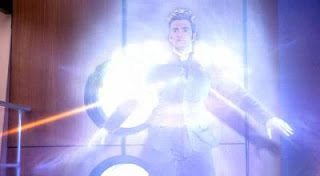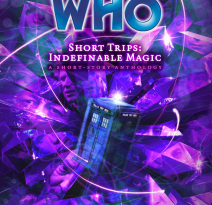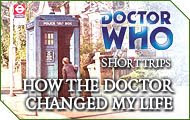 Over the many years of Doctor Who, the Doctor has become more and more of a superhero. The First Doctor started off as an old man, a crochety explorer, who got dragged into events and was more likely to be trying to get back to the TARDIS than to save the day. He could be outwitted for months on end by Marco Polo pinching his TARDIS key. Sometimes he did things of dubious morality, like sabotaging his own ship to get his way to explore Skaro, and got things wrong and made mistakes.
Over the many years of Doctor Who, the Doctor has become more and more of a superhero. The First Doctor started off as an old man, a crochety explorer, who got dragged into events and was more likely to be trying to get back to the TARDIS than to save the day. He could be outwitted for months on end by Marco Polo pinching his TARDIS key. Sometimes he did things of dubious morality, like sabotaging his own ship to get his way to explore Skaro, and got things wrong and made mistakes.
But over time, he has become more and more of a conventional hero, running, jumping, saving the world on a weekly basis. He’s developed a whole array of superhuman abilities, from regeneration to respiratory bypass, from telepathy to time manipulation. He has almost limitless abilities to manipulate technology, and seemingly encyclopaedic knowledge of the entire universe and all of history.
Part of this is due to escalation: there’s always the desire to make things bigger, to give the Doctor ever greater challenges, to save not just a few people, but the world; not just the world, but the universe.
Part of this is due to shorter stories since the series returned – there isn’t as much time for the Doctor to discover things, make mistakes before learning from them, and so on. Because he’s the Doctor, he always wins, and because most weeks he’s only got 45 minutes in which to do so, he needs to know all about every alien species and have the ability to defeat his enemies with the flick of the switch.
But the more difficult it is for the Doctor to succeed, the greater the drama and more interesting the story, and the more heroic the Doctor actually is. His knowledge and abilities, though greater than normal, need to be limited, otherwise it undermines his heroism. Should the Doctor (and hence the stories told in Doctor Who) be brought down to a more human level? Is it possible to put the genie of the super-Doctor back in the bottle?
I believe so. I think the Doctor’s “abilities” should be limited to:
- his long life and ability to regenerate
- his great knowledge and experience
The first point means he shouldn’t reveal a spurious new alien ability to get the writer out of a corner, which is very dramatically unsatisfying. The cliffhanger resolution to Aliens of London is a case in point: there hasn’t been anything to suggest that the Slitheen’s method of killing off the experts on aliens is targeted at humans in particular, or has any reason not to work on Time Lords, and so it feels like a cheat when the Doctor goes “Aha! Lethal to humans, maybe, but I’m not human!”. Other examples include the Doctor’s radiation-manipulating abilities from Smith & Jones, his respiratory bypass system from the classic series, and so on.
On the second point, the Doctor shouldn’t know too much. A wide general knowledge is fine, but the universe is mind-bogglingly big, and even in 900 years, you could only learn about a tiny fraction of the civilisations and history and technologies of even one galaxy, let alone the entire universe. It should be the norm rather than the exception for the Doctor not to know about the latest monster or planet.
It also means that the Doctor shouldn’t have his amazing Magic Science Skills, whereby he can turn any piece of technology into a “Defeat Villain Now” button with a wave of the sonic screwdriver. The DoctorDonna’s defeat of the Daleks by pressing a few buttons in Journey’s End is a perfect example of this. Yes, it’s Donna who does this, not the Doctor, but the only way this makes any kind of sense is if the Doctor’s Magic Science Skills are a superpower that can get transferred, like Superman’s powers with the help of kryptonite (a.k.a. plotdeviceite) and a convenient lightening strike.
When the Doctor uses technology to solve the plot, it needs to make sense within the logic of the story so far. The Poison Sky gets points in my book because there’s a good reason for Rattigan to have an atmospheric converter, and so the way the gas is dispelled is set up in advance rather than relying on the Doctor’s amazing Magic Science Skills. It loses points for having the Doctor set fire to the atmosphere without any harm or damage at all, but there you go.
The Family of Blood contains one of the most blatant example of Magic Science Skills at work, when the Doctor blows up the Family’s spaceship just by flicking some switches. It gets away with it because that’s not the real climax: the actual crisis point is the decision for John Smith to open the watch and become the Doctor again, so the story is still satisfying because the how of how the Doctor defeats the villains isn’t the point. But while the Doctor being “fire and ice and rage” is exciting and cool at the time, but it’s unsustainable to keep on writing the character that way. He needs to be brought back down to Earth.
I think it’s a fallacy to say, as some fans have argued, that because the Doctor has defeated gods and armies of monsters, a human can never be a challenge to him. There’s something wonderful about a hero who can save the universe one week and then be foiled by someone pinching his keys the next week. The villains in Doctor Who are often defeated by something painfully simple and obvious, and the same principle can apply to the Doctor: he may be brilliant, but when he’s used to facing down hordes of Daleks, sometimes it’s the simple things that can catch him out. There’s a lot of mileage in that.
I also think that it ultimately undermines the Doctor if he’s saving the world every week. There are lots of reasons why smaller scale stories should be more common. For one thing, it forces the writer to make us actually care about the characters and the world that we see on screen to involve us and raise the stakes, rather than David Tennant going googly-eyed and babbling about the end of the world. It also requires more variety in plots than having yet another alien species wanting to “build a new Empire” (it’s always an Empire, otherwise how would we know they are Evil?) For another thing, it makes it really matter when the Doctor does save the entire world.
You need the rhythm and variation from smaller to bigger, from intimate to epic. Doctor Who has an almost unparalleled ability to do that, but is in danger of constantly going for “EPIC!” to the point of monotony. Sometimes you have to go smaller to go bigger.







